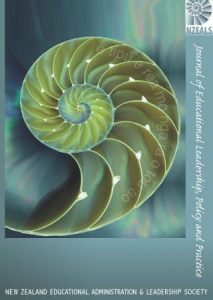JELPP Special Edition
 Where to next? (Re)forms of leadership in New Zealand education over the last 30 years
Where to next? (Re)forms of leadership in New Zealand education over the last 30 years
Guest Editors: Howard Youngs and Cathy Wylie
Purpose of the special edition
Leadership over the past 30 years has increasingly become a major component of the nomenclature evident in New Zealand education practice, policy, and research. Similar shifts have occurred across the Educational Management Administration and Leadership (EMAL) field in other nations. The major New Zealand education reforms of the late 1980s and early 1990s saw a shift from centralised forms of educational governing to self- managing organisations. This placed more focus on executive leading and managing and in particular the role of school principal.
In parallel to this developing focus, Leadership Studies was evolving from a near sole focus on leader-centric theories, and leader- follower framing, to post-heroic approaches that broadened the boundaries of leadership beyond those in organisational management roles. The EMAL field has evolved to include distributed, shared and collaborative forms of leadership practice, alongside the focus on individual executive leaders. In addition, there has been a growing emphasis on learning and teaching as a core component of EMAL practice, policy, and research, as well as the prominence of various forms of middle- layer leadership. All these forms, whether executive, middle or distributed are evident in early childhood education, primary and secondary schools, as well as the various forms of higher education Institutions across the New Zealand education sectors. Each sector contributes to different a blending and expressions of these forms of educational leadership.
The purpose of this Special Edition is to look forward and ask where to next with leadership practice, policy, and research in education, looking through a lens of the past. We invite contributors to this Special Edition to draw upon one or more of the following guiding questions. Looking back over the past 30 years, with educational leadership practice, policy, and/or research:
- How are your experiences or understandings of leadership now different, compared to when you started? Have you had to do any ‘unlearning’?
- What have you learned along the way?
- What theoretical shifts have occurred with how we understand and research educational
leadership? - Are we in a better place now compared to 30 years ago? Do we have the right conditions for
enjoyable and effective leadership? - What do you think needs to happen next in leadership practice, policy, and/or research?
The Special Edition Co-Editors welcome leaders’ stories of leadership practice, policy, and/or research, in addition to more academic papers associated with the purpose of this Special Issue.
The Co-editors invite expressions of interest, in the form of a 250-word abstract, by Monday 21st October. Initial submission of articles should be received by the editors no later than Monday 9th December 2019. Once refereed, the editors will contact all authors by Monday 3rd February 2020 and notify them of the outcome of their submissions. Selected articles that require revisions will be returned to the authors and all revisions must be completed and the article re-submitted no later than Monday 24th February 2020.
Editorial requirements for articles are available online here, and the journal homepage.
|
Howard Youngs |
Cathy Wylie Cathy.Wylie@nzcer.org.nz Guest Editor |


 Where to next? (Re)forms of leadership in New Zealand education over the last 30 years
Where to next? (Re)forms of leadership in New Zealand education over the last 30 years